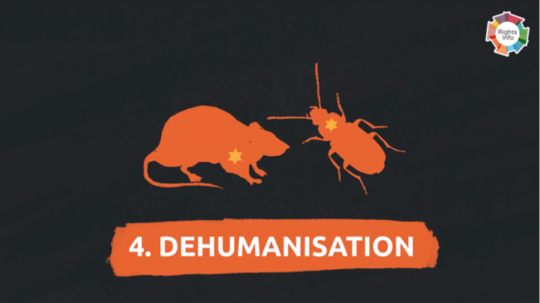
Ruth: (Holocaust survivor) I think there were definitely warning signs there. But I don't think they were so much ignored as denied.
Eric (Rwandan genocide survivor) : Something serious was building, building up, but never thought that it was going to be horrible as it turned out to be.
Kemal (Bosnian genocide survivor): History can teach us so much. But we keep ignoring history lessons at our own peril all the time.
Ruth: I was born in 1935, when the Nazis were already four years in power. I was very sheltered. I was blissfully unaware of what was going on outside.
Kemal: I was born and raised in rural Bosnia. My family had lots of animals. We grew some crops. You know, my childhood was pretty much idyllic.
Eric: I grew up in a very stable family environment. I went to school, I played football.
Kemal: When I was a teenager, some media started employing propaganda to vilify one particular group, Albanians. After 1984, this propaganda became more vicious.
Eric: The government of that time put in place those rules that Hutus had more right to jobs and education and Tutsis had less.
Ruth: The Jewish community was used to persecution, and mostly thought that if they didn't make trouble, it would all blow over. And it wasn't until Kristallnacht that they really woke up to realising it wasn't going to blow over.
Eric: I went to this primary school, the teacher asked to raise our hands. Tutsis on this side, Hutus on that side.
Ruth: Almost immediately after the Nazis came to power, my father was sacked from his position as a judge. Aryan Germans were not allowed to employ Jews.
Eric : A number of friends and family members got arrested purely because they were Tutsis.
Ruth: I came to England on the Kindertransport in 1939. I can remember being very shocked at the huge size of the boat. I remember being frightened that the boat would sink, too many people and too much luggage.
Kemal: I ended up in the Omarska camp, the most notorious concentration camp in Bosnia. I was there for two and a half months, but every day was like a whole eternity because you just want to survive. You just want to live.
Ruth: Most of the population were terrified the Nazis dominated and terrorised. They completely perverted the legal profession, the teaching profession, the medical profession.
Eric: During the genocide, I lost so many family members, including a young brother of mine, who was just seven years old, at the time.
Kemal: After two weeks they began the process of interrogations, but I say interrogations, but it was really the process of torture.
Eric: It became normal to call a Tutsi a cockroach. I think we somehow accepted it. A number of people went out and killed their fellow human beings, without realising that they were killing really human beings. They believed that they are cockroaches.
Ruth : The lessons of the Holocaust have not been learned. The fundamental lesson that all human beings are equal as human beings, we're a long way from accepting that.
Kemal: In 1992 history came knocking on my door, and I became a victim of genocide. Right now history seems to be knocking on everyone's door. We constantly have to fight for our human rights because so many people before us have fought for them and died for them.
Ruth: "I'm only one person I can't do anything about it anyway." I think that was probably the attitude of most people and still is today. We need a massive drive to raise awareness of the existence of human rights.
Kemal: I have seen and survived something that I feel no human being should ever be aware of. I feel that humanity can benefit from such stories, in hope that they don't have to go through the same experiences.










